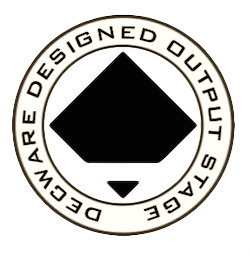
Decware Designed
Output Stage
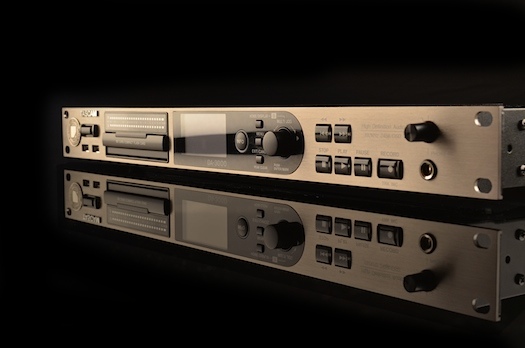
Decware Model ZDSD
Front View
Overview
So you're looking for a great DAC?
This Decware modified pro-audio ADDA
from Tascam supports standard
and hi-resolution formats
including PCM 16/24 BIT 44kHz
~192kHz, DSD and double DSD
5.6MHz
Although it can be hooked to a
computer or your favorite transport
or anything with a digital output...
our favorite thing about it is
the SD cards! This makes it
possible to hear your sound files on
a 100% hardware solution without
being hooked up to a computer or
the internet. Below is a list of the
following variables this can
eliminate:
1)
What type of computer you have and
its effect on the sound?
2)
What operating system does
it run on?
3) How
fast is the hard drive
in it?
4)
How much memory is available for buffering?
5) Which of the
dozens of playback software
solutions you have?
6) Are they
configured correctly?
7) What plug-ins are
installed?
8) Do you have the
proper and up to date software
drivers?
9) Are the sound
adjustments on the computer
configured right?
10) What USB formats
does your computer support?
11) What kind of
audiophile USB cable should you
run?
12) Is the computer
running an aftermarket updated
power supply?
This is obviously the short list...
And with all these variables can
come hours of computer induced
headaches and wasted time only to
leave you wondering if you REALLY
ARE getting
bit perfect output to your
DAC?
Without all these
variables come hours of blissful
music enjoyment with rock solid
consistency that you can
explicitly trust.
Give yourself an honest test. Ask
yourself how much time in minutes
(hours, days) total you have spent
getting your computer set up and
working as a reference audiophile
grade playback device! And what did
the cables and software cost?
BTW, you're not using it for
anything other than music right? We
assume you've dedicated it solely
for audio playback with everything
else stripped off it to prevent
software running in the background
from changing various audio
settings... especially Windows
users.
Imagine an alternative...
you just drag and drop your files
onto an SD card or USB
stick. You plug the card or
stick into the front of the
Tascam... You press play... In less
than 1 second, it plays. No spinning
wheels of death, no surprises, no
disappointments.
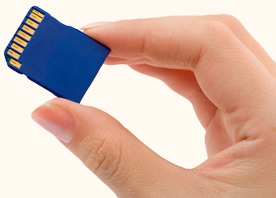 BTW,
it's possible to hold over BTW,
it's possible to hold over
5.8 hours of Double DSD formatted
music on a single SD card! OR you
can have 47
hours of 16/44
non-compressed CD quality music on
the same tiny card!
A large display makes it easy to rotate
through and select any of the music
on the card with lightning speed...
faster than a CD player!
This
is a pure hardware solution
that when coupled with
designer Steve Deckert's High
Gain Transformer-Coupled
Output Stage, let you
experience the digital
format at it's very best.
What makes the Decware
modification to this Tascam
machine a somewhat unfair
contest with other DAC's
is the adjustable high output,
low impedance transformers
that can give you the full
voltage of professional
balanced output into a single
ended RCA jack that floats.
That means it's actually still
balanced until you create a
common ground by hooking it to
your amplifier or
preamplifier. We've found this
adjustable transformer
coupled output to sound
superior to the standard
unbalanced outputs on the
machine. In fact we've left
the stock unbalanced outputs fully
operational so you can
compare the two outputs and
appreciate the true value of
the Decware modifications.
So what does this output
stage sound like...
well, the improvement in
density is almost hard to
believe. Through the Decware
output stage you'll hear
digital that has the same
density as tape when the
output is adjusted to -20dBFS.
It's good enough to sway
the hardcore analog freaks
among us.
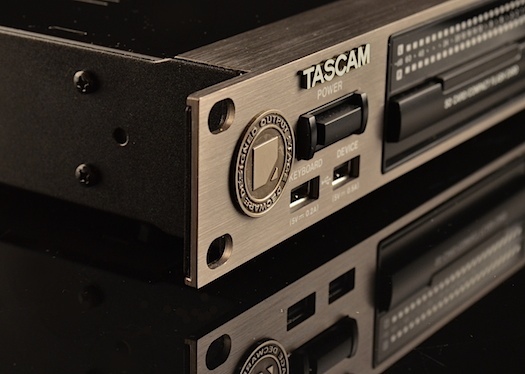
Decware
Model ZDSD Front View
BONUS:
YOU CAN RECORD DSD AUDIO
WITH IT - If you're not into wasting
money on special software and
inferior hardware to record your
albums or tapes, stay tuned because
this machine is simply a fantastic
digital recorder. It records
directly to SD cards making it
possible to get perfect hi-res bit
perfect DSD and double DSD
recordings of your analog treasures
with results so true to the source
you'll have trouble telling the two
apart.
The
Decware Output Stage
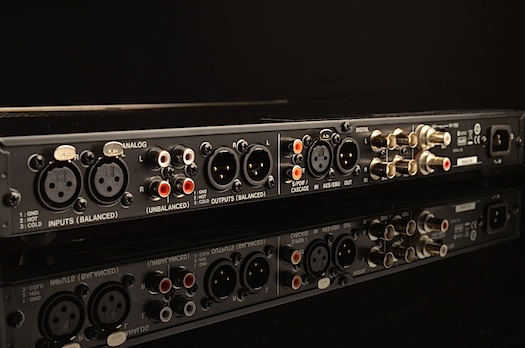 f f
Decware Model ZDSD
Rear View
Not
only can you have some trouble
telling the source from the
recording, but the adjustable Decware
output stage makes it possible
to create a higher output level than
the source originally had. The
result can be recordings that are
more animated and with more
slam and than the original... this
can make your digital recording
actually sound more appealing than
the original.
As seen in the picture above the
rear of the Model ZDSD is
outfitted with a pair of Silver
RCA output jacks that work
independently of the stock balanced
and unbalanced outputs on the
machine. These Silver Jacks are the
output of a fully differential
balanced circuit driving a fully
floating pair of high gain, wide
bandwidth transformers. The result
is between two and five times the
standard 2 volt output of the stock
RCA jacks. The amount of output is
adjustable from the front control
panel.
This output design is what it
took to compete with the density
of tape, the holy grail of
analogue. Because of it's adjustable
high output, the dynamics it
reproduces are explosive, and the
tremendous weight and power of music
comes through, just as it does on
tape. Also it's important to note
that this is the result right out of
the machine. It did not take
an additional tube preamplifier to
accomplish this result, nor is one
required.
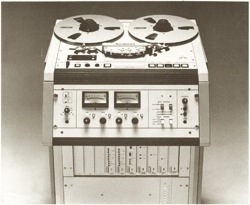 To develop
and voice the custom output stage we
used our Otari Tape Machines to play
15 IPS master tapes and used
the ZDSD to record and playback the
tapes until the recordings actually
sounded as enjoyable as the tape
machine itself. To develop
and voice the custom output stage we
used our Otari Tape Machines to play
15 IPS master tapes and used
the ZDSD to record and playback the
tapes until the recordings actually
sounded as enjoyable as the tape
machine itself.
It's digital that doesn't sound very
digital.
Up-sampling
Up-sampling can be turned on
or off from the front
control panel, but once you hear the
difference it makes when playing 16
bit files (or CD's), you certainly
won't ever want to turn it off! If
you have a CD player connected to
this machine and have up-sampling
turned on, your CD's will sound like
super audio files (DSD) and this
may be where this offering from
Decware is cheered the most!
The algorithms combined with the
unique temperature compensated 1
PPM resolution clock crystal
make the up-sampling in this machine
so good you won't be very motivated
to spend money on hi-res downloads
of your favorite CD's because it's
too hard to hear the difference.
Consistency
& Reliability
There are no moving parts in this
machine. There is no software. There
is no firmware. The ZDSD a 100%
hardware solution that never stops
working. It has a tube sound, but
uses transformers instead of
tubes so nothing to wear out
or replace... ever.
Low Risk
If
the design itself doesn't take
enough risk out trying a ZDSD in
your system, we challenge you to get
one today and put it up against
your favorite DAC and keep only
the winner. You'll have a full
30 days to try it in your own
home with a money back guarantee
less a 10% restock fee.
NOW AVAILABLE IN
240VAC
Media
|
|
|
| Supported
Media |
|
SD:
4 to 32 GB SDHC cards (media
ejection method: push-push)
CF: 1 to 64 GB Type I CF Cards
USB: Supports 2 to 64 GB flash
drives (playback and copying
only) |
Formats
|
|
|
| Record/Play
Format |
|
PCM:
BWF (record and play), WAV
(playback only) @ 44.1, 48,
88.2, 96, 176.4, 192 kHz, 16 or
24-bit
DSD:
DSDIFF / DSF, 2.8224, 5.6448 MHz
|
| Channels |
|
2x
Mono or 1x Stereo |
I/O
|
|
|
| Analog
Input |
|
Unbalanced:
Connector: 2x RCA pin jacks
Standard Input Level: -10 dBV
Maximum Input Level: 6 dBV
Minimum Input Level: -22 dBV
Input Impedance: 22 kΩ or
greater
Balanced:
Connector: 2x XLR-3-31 (1: GND,
2: HOT, 3: COLD)
Standard Input Level: 4 dBu, 6
dBu (only when maximum input
level is 15 dBu)
Maximum Input Level: 15 dBu, 18
dBu, 20 dBu, 22 dBu, 24 dBu
(switchable in menu)
Minimum Input Level: -8 dBu, -6
dBu (only when maximum input
level is 15 dBu)
Input Impedance: 10 kΩ or
greater |
Analog
Outputs
|
|
Unbalanced:
Connector: 2x RCA pin jacks
Standard Output Level: -10 dBV
Maximum Output Level: 6 dBV
Output Impedance: 200 Ω or less
Balanced:
Connector: 2x XLR-3-31 (1: GND,
2: HOT, 3: COLD)
Standard Output Level: 4 dBu, 6
dBu (only when maximum input
level is 15 dBu)
Maximum Output Level: 15 dBu, 18
dBu, 20 dBu, 22 dBu, 24 dBu
(switchable in menu)
Output Impedance: 100 Ω or less
|
| Digital
Input |
|
S/PDIF,
Cascade:
Connector: RCA Pin Jacks,
unbalanced
Format: IEC60958-3 (S/PDIF)
Input Impedance: 75 Ω
Input Frequency with SRC Off:
44.1, 48, 88.2, 176.4, 192 kHz
Input Frequency with SRC On: 32
to 216 kHz
Allowable Frequency Deviation:
+/-100 ppm (when SRC OFF)
AES/EBU:
Connector: XLR-3-31 (1:GND,
2:HOT, 3:COLD), balanced
Format: AES3-2003/IEC60958-4
(AES/EBU)
Input Impedance: 110 Ω
Input Frequency with SRC Off:
44.1, 48, 88.2, 176.4, 192 kHz
Input Frequency with SRC On: 32
to 216 kHz
Allowable Frequency Deviation:
+/- 100 ppm (when SRC OFF)
SDIF-3:
Connector: 2x BNC, unbalanced
Format: SONY SDIF-3/DSD-raw
Input Impedance: 75 Ω, +/- 20%
Clock Synchronization Frequency:
44.1 kHz |
| Digital
Output |
|
S/PDIF,
Cascade:
Connector: RCA Pin Jacks,
unbalanced
Format: IEC60958-3 (S/PDIF)
Output Impedance: 75 Ω
AES/EBU:
Connector: XLR-3-31 (1: GND, 2:
HOT, 3: COLD), balanced
Format: AES3-2003/IEC60958-4
(AES/EBU)
Output Impedance: 110 Ω
SDIF-3:
Connector: 2x BNC, unbalanced
Format: SONY SDIF-3/DSD-raw
Output Impedance: 75 Ω, +/- 20%
Clock Synchronization Frequency:
44.1 kHz |
| Control |
|
Input
and Output
Infrared Receiver: Tascam RC-10
Wireless Remote Control
|
| Headphones |
|
Connector:
1/4" (6.3 mm) stereo jack
Maximum Output: 45 mW + 45 mW
(into 32 Ω load, 0.1% distortion
|
Recording
|
|
|
| Response
|
|
PCM:
20 Hz to 20 kHz +0.1 dB/-0.5 dB
(Fs=44.1/48 kHz, JEITA)
20 Hz to 40 kHz +0.1 dB/-1 dB
(Fs=88.2/96 kHz, JEITA)
20 Hz to 80 kHz +0.1 dB/-6 dB
(Fs=176.4/192 kHz, JEITA)
DSD:
20 Hz to 50 kHz +0.1 dB/-3 dB
(DSD, JEITA)
20 Hz to 100 kHz +0.1 dB/-12 dB
(DSD, JEITA) |
Distortion
|
|
THD
+ N, 1 kHz:
0.003% or less (Ref:-16
dB/BALANCED, JEITA)
0.005% or less (UNBALANCED,
JEITA) |
| Signal
to Noise |
|
CM
(24-bit Mode):
113 dB or higher (Ref:-20
dB/BALANCED, JEITA)
111 dB or higher (UNBALANCED,
JEITA)
DSD:
106 dB or higher
(Ref:-20dB/BALANCED, AES-17 20k
LPF)
104 dB or higher (UNBALANCED,
AES-17 20k LPF) |
| Crosstalk |
|
108
dB or higher (JEITA) @ 1 kHz
|
Playback
|
|
|
| Response
|
|
PCM:
20 Hz to 20 kHz +/-0.1 dB
(Fs=44.1/48 kHz, JEITA)
20 Hz to 40 kHz +0.1 dB/-0.3 dB
(Fs=88.2/96 kHz, JEITA)
20 Hz to 80 kHz +0.1 dB/-3 dB
(Fs=176.4/192 kHz, JEITA)
DSD:
20 Hz to 50 kHz +0.1 dB/-3 dB
(DSD, JEITA)
20 Hz to 100 kHz +0.1 dB/-12 dB
(DSD, JEITA) |
Distortion
|
|
THD
+ N, @ 1kHz
0.003% or less (Ref:-16
dB/BALANCED, JEITA)
0.001% or less (UNBALANCED,
JEITA) |
| Signal
to Noise |
|
PCM:
118 dB or higher (Ref:-20
dB/BALANCED, JEITA)
116 dB or higher (UNBALANCED,
JEITA)
DSD:
116 dB or higher (Ref:-20
dB/BALANCED, AES-17 20k LPF)
114 dB or higher (UNBALANCED,
AES-17 20k LPF) |
General
|
|
|
| Power
|
|
AC
120 V, 60 Hz(US/Canada Version)
|
Consumption
|
|
24
W |
| Operating
Temp |
|
32
to 104°F (0 to 40°C) |
| Dimensions |
|
19
x 1.7 x 12" (483 x 45 x 305 mm)
|
| Weight |
|
9.2
lb (4.2 kg) |
Features
- Operation
possible using included
RC-10 wireless remote
control
- Transformer
Coupled Decware implemented
output stage
- Audio files
prepared on a computer can
be played back
- Can also be
hooked to any digital source
and operate like a DAC
- Can be the
DAC for your computer with digital
output (not USB)
- Can be the
DAC for any transport or CD
player
- Can
alternately be run stand
alone with just memory cards
- Can Record in
16/24 bit formats including
DSD
- Uses USB
flash drives, CF or SDHC
memory cards.
- USB port for
USB flash drive (supports
USB 2.0)
- USB host port
supports copying between USB
flash drives and CF/SDHC
cards
- Repeat
playback function (all files
or single file)
- Folder
playback function can be
used to play all files in a
folder
- Playlist
function allows files to be
programmed in advance for
playback
- Analog input
and output reference levels
can be set to
-9/-14/-16/-18/-20dBFS
- Digital input
has a sampling rate
converter (supports 32 to
216kHz)
- XLR digital
input/output (supports
AES3-2003 and
IEC60958-4:AES/EBU formats)
- RCA Coaxial
digital input/output
(supports IEC60958-3:S/P DIF
format)
- BNC digital
input/output for DSD
(supports SDIF-3 and DSD-raw
formats)
- RCA analog
unbalanced input/output
- XLR analog
balanced input/output
- Fan-less
design eliminates unwanted
noise
- EI core
transformer used in power
supply section
- Dual mono
circuits eliminate
interference between left
and right channels
- Fully-balanced
circuits realize low noise
- 128x64 OEL
display with a wide viewing
angle
- 24-dot stereo
LED level meters with
adjustable brightness make
checking levels easy
- Divide and
delete functions can be used
to manage files that are
already recorded
- UNDO function
can be used to cancel the
previous operation
- File names
can be changed
- Direct
location possible when a USB
keyboard is connected
- Word clock
master can be set to
Internal, Word input or
Digital inputs
- Oscillator
function (440Hz, 1kHz,
10kHz)
- Input
monitoring function allows
input signals to be output
without recording
- TCXO with
1ppm precision
- Backup memory
stores settings even when
the power is off
- Aluminum
front panel harmonizes with
other studio equipments
design
- Standard 1/4"
headphones jack provides
45mW/ch output
- USB port for
USB keyboard (supports USB
1.1)
- EIA 1U
rackmount size
- RoHS
compliant
- Stereo
recording to SDHC card or CF
card
- PCM recording
format: BWF
(44.1/48/88.2/96/176.4/192kHz,
16/24bit)
- DSD recording
format: DSDIFF/DSF
(2.8/5.6MHz)
- SD card slot
(supports 4 to 32GB SDHC
cards)
- CF card slot
(supports UDMA)
- WAV file
playback
- Recording 2
mono files from stereo input
possible
- Mark
functions can be used set up
to 99 points per file (mark
information can be used in
software that supports BWF
format)
- When
recording, designation of
the recording file folder
possible
- Synchronized
recording using level, stop
time and recording start
delay time setting
- Input level
can be adjusted in 0.5dB
step
- Using
automatic track incrementing
function, new files can be
created automatically while
continuing to record when a
condition (level, file size,
digital input) set in
advance occurs
- Manual track
incrementing function can be
used whenever you like to
create a new track while
continuing to record
- Automatic
mark functions can be used
to easily check problems
(levels, word clock
unlocking) detected during
recording
- File name
format can be set to either
a user-defined word or the
date and time
* Please take 1U
or more of blank space above
the ZDSD for ventilation.
|
Support
Modified in the USA by
DECWARE / High Fidelity Engineering
Co. It comes with a one year
warranty to the original
owner.
We also have a support
forum with many people who's
experiences you may benefit
from.
Reviews
You may
read reviews
of our products going
back to 1996.
|




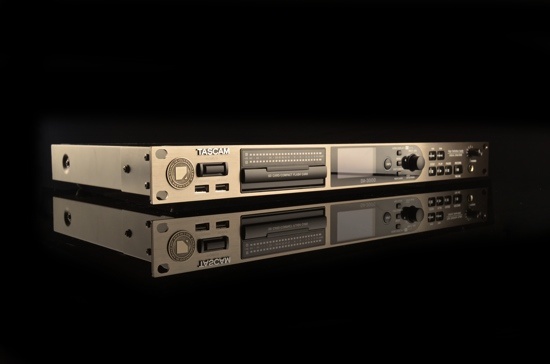










 To develop
and voice the custom output stage we
used our Otari Tape Machines to play
15 IPS master tapes and used
the ZDSD to record and playback the
tapes until the recordings actually
sounded as enjoyable as the tape
machine itself.
To develop
and voice the custom output stage we
used our Otari Tape Machines to play
15 IPS master tapes and used
the ZDSD to record and playback the
tapes until the recordings actually
sounded as enjoyable as the tape
machine itself. 
